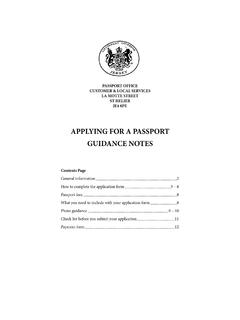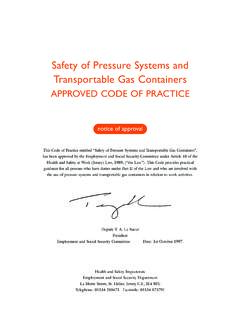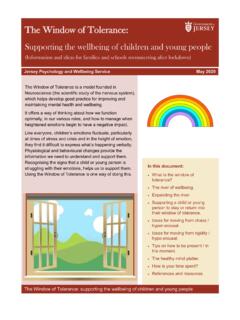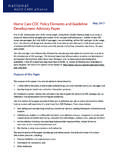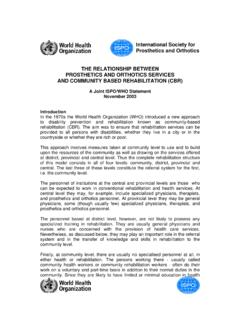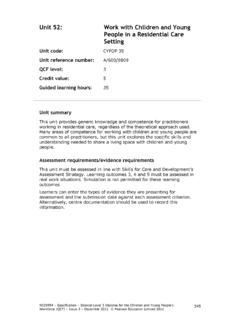Transcription of Regulation of Care (Jersey) Law 2014 Draft Regulations for ...
1 1 Stakeholder Consultation Community and Constitutional Affairs Regulation of care (Jersey) Law 2014 Draft Regulations for care Homes, care at Home and Adult Day care services Contents 1. Introduction 2. Regulation of care (Regulated Activities) Regulations - Draft 3. Regulation of care (Standards and Requirements) (Jersey) Regulations 201- Draft 4. Responding to the consultation 1. Introduction Background This purpose of this consultation is to offer interested parties an opportunity to be aware of, and comment on, proposed new Regulations supporting the Regulation of care (Jersey) Law 2014 (the 2014 Law ). The Regulation of care Law, adopted by the States Assembly in 2014 provides a modern framework for the Regulation of health and social care in Jersey. The 2014 Law cannot come into force , however, until there are Regulations describing what services will be regulated and what those services must do to ensure the care provided is safe and of high quality.
2 The Draft Regulations presented in this consultation apply to care Homes, care at Home services and Day care services for adults which will form the first phase of the new regulatory regime. These Draft Regulations were developed taking into account the views expressed by Stakeholders during an earlier consultation1 This consultation relates to two sets of Draft Regulations , which are attached and should be read in conjunction with this consultation report. The first describes the characteristics of services that will be regulated. The second sets out requirements and regulatory tools to ensure services provide care that is safe and of a high quality. At the end of each section of this consultation document, stakeholders are asked for their feedback on a number of key questions. 1 Regulation of care (Jersey) Law 2014, Proposed care Home and Home care Regulations , Response to Stakeholder Consultation, October 2015.
3 2 Definitions and terms used in this consultation document The 2014 Law sets out a number of definitions on which the Regulations are based, these include: Health care : includes all forms of health care (including nursing care ) provided to individuals whether relating to physical or mental health, and also includes procedures that are similar to forms of medical or surgical care but are not provided in connection with a medical condition Social care : includes all forms of personal care and other practical assistance, and all forms of personal support, provided for individuals who by reason of their age, illness, disability, pregnancy, childbirth, dependence on alcohol or drugs, or by any other reason, are in need of such care , assistance or support Nursing care : means services that, by reason of their nature and circumstances, including the need for clinical judgement, should be provided by a nurse, including (a) providing care ; (b) assessing, planning and evaluating care needs or the provision of care ; and (c) supervising or delegating the provision of care Personal care : means assistance in daily living that does not need to be provided by a nurse, being (a) practical assistance with daily tasks such as eating, washing and dressing; or (b) prompting a person to perform daily tasks; Personal Support: includes supervision, guidance, counselling (other than counselling that is health care ) and other support in daily living that is provided to an individual as part of a programme of such support.
4 Registered provider: refers to the person or organisation that is registered to operate a care service (effectively the business owner). Registered manager: refers to the person who is registered to manage a care service on a day to day basis Registered person: refers to both the provider and the manager. Regulation of care (Regulated Activities) Regulations 2. Regulation of care (Regulated Activities) Regulations Draft These Regulations define and describe three types of services ; care homes, care at home and adult day care services which will become a regulated activity under the new 2014 Law. care Home - Regulation 1 The essential feature of a care home is that it offers both care and residential accommodation; care can be personal care , nursing care or personal support. care homes can provide both long and short term care such as respite, rehabilitation and reablement services for adults and children with a variety of health and social care needs.
5 This definition covers but is not limited to: care homes for older people care homes for people with mental health conditions, group homes for people with special needs, residential rehabilitation services for people with addictions, 3 accommodation and support for people who are homeless, homes for looked after children, including secure children s homes, accommodation where support is provided for people who are vulnerable due to domestic violence Regulation 1 also specifies services that will not fall within the definition of a care home, in particular: acute hospitals, schools, young offenders institutions and private accommodation Home care Regulation 2 This is refers to nursing or personal care or personal support provided to people in their own private home by an agency, States department or an individual who is paid either in money, or in kind, to provide the care .
6 Private care agencies, Health and Social services Department s (H&SSD) domiciliary care , outreach services and individuals privately employed would, for example, fall within this definition. The element of reward is important in the definition as there is no intention to regulate families, friends or good neighbours. The home care definition also includes professional care provided for free, unless this is part of a service that is only provided by H&SSD. For example, H&SSD s Drug and Alcohol Service, community mental health staff who work as part of the mental health multidisciplinary team, and specialist nurses working as part of a hospital multidisciplinary team ( : cardiac nurse specialist, respiratory nurse specialist) will not be not be included within the regulatory framework at this stage. Adult Day care Regulation 3 Adult day care facilities will fall within the definition of a regulated activity if they are providing nursing or personal care , or personal support for a limited period of time, in premises that does not offer overnight accommodation.
7 The definition does not include self-help groups, or social/friendship clubs. Question 1 YES NO DON T KNOW (a) Do you agree with the definition of a care home? (b) Do you agree with the definition of a home care service? (c) Do you agree with the definition of adult day care services ? Do you have any comments about the services we propose to include with the regulatory framework? 4 3. Regulation of care (Standards and Requirements) (Jersey) Regulations 201- Draft These Regulations aim to give people using care services , and their relatives, confidence that that the care they will receive will be appropriate, safe and of a high standard. They include provisions concerning the suitability of people registered to operate and manage care services , the quality of care provided, operational requirements and arrangements relating to inspection. Criteria for Registration The Regulations set out the criteria against which a provider or manager will be judged to be fit to be registered and the conditions applied to a registration to ensure the service is appropriate for the people receiving care .
8 It is essential that those trusted to provide care to people who, by the nature of their circumstances may be very vulnerable, are suitably qualified, competent, in good health and of good character. Where the provider is a body corporate (company, trust, voluntary agency etc.) each of the directors, trustees, board members are liable under the 2014 Law for the proper performance of the regulated activity and are be required to be a fit person . People who apply to provide or manage a regulated activity must: be of good character be physically and mentally fit to carry out the regulated activity have the necessary qualifications, knowledge, skills and experience Disqualifications from registration A person shall be deemed unfit to be registered to carryon or manage a regulated activity if: he or she has been sentenced to imprisonment (whether immediate or suspended) without the option of a fine and is in the reasonable opinion of the Commission unsuitable to be registered His/her name appears on the barring list held under the UK safeguarding vulnerable adults legislation, the protection of vulnerable groups scheme in Scotland s/he has ever been declared bankrupt s/he is disqualified for holding office as a company director in Jersey or elsewhere In additional, a person shall be deemed unfit to be a registered manager if the person is: required as part of his or her employment as a manager to hold a professional registration but does not hold that registration, for example; nurse, social worker etc.
9 Not physically or mentally fit to carry out the regulated activity 5 Question 2 Yes NO DON T KNOW Do you agree with the proposed criteria for assessing the fitness of providers and managers of care services ? Do you have any comments about the proposed criteria? Conditions of Registration The process for applying conditions to a provider s registration is set out in the 2014 Law. This includes a right of appeal against any condition the Commission wishes to apply that is not already agreed with the provider as part of their registration. The proposed Regulations oblige the Commission to apply specific registration conditions for the purpose of ensuring that once registered a service remains appropriate for the needs of the people receiving care . The 2014 Law however is sufficiently flexible to enable a registered provider or manager to apply for a change or variation in the registration conditions should the circumstances or needs of a service change.
10 In general, the conditions applied to a registration will be based be on information supplied by providers in their Statement of Purpose which forms part of the application process. The Statement of Purpose will include the aims and objectives of the service, the type of care offered by the service, the number people provided care and details of how the service will operate. The conditions applied to a provider s registration include administrative details such as having a local address and providing the addresses of each location from which the service operates. They also include quality and safety features intended to ensure the service is capable of meeting users needs. This includes, for example, setting a maximum number of people for whom the service can provide care , the age ranges of people using the service and the types of care that can be provided. Providers will also be required to operate the service in accordance with the Statement of Purpose and pay an annual fee each year.


